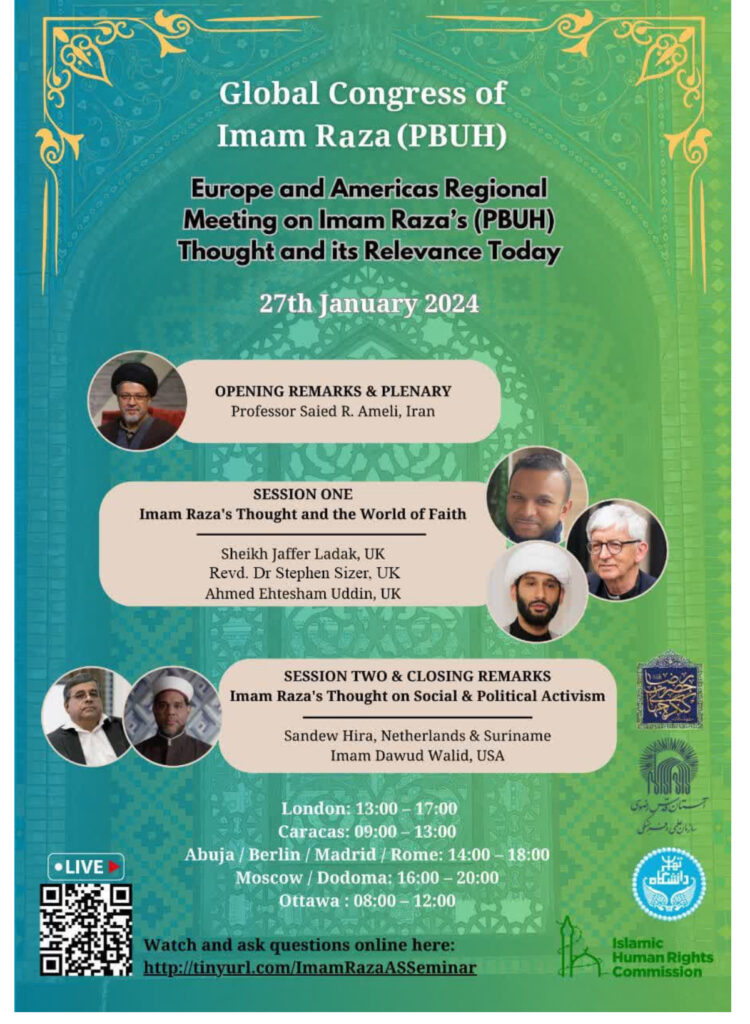A paper delivered at a conference organised by Astan Razavi in conjunction with the University of Tehran and Sharif University of Technology entitled, “Civilisational Thoughts of Imam Raza (peace be upon him_: Justice for all and injustice for no one.” (download a copy here)

In this short presentation I will be reflecting on the life and teaching of Imam Ali al-Raza as summarised in the Razavi Codes of Ethics,[1] comparing and contrasting them with ethical instructions taught by Jesus Christ found in the four Gospels of the New Testament. Given that those participating will likely already be familiar with the example and teaching of Imam Raza, I will elaborate more on the teaching of Jesus to illustrate similarities and differences, recognising that Imam Raza, living many centuries after the New Testament was written, may well have been influenced by it, consciously or otherwise.
This will not however, be an exhaustive or comprehensive analysis of Islamic and Christian ethical codes, but rather a comparison of some of the 13 examples contained in the Razavi Codes of Ethics with similar statements found in the teaching of Jesus.
However, I am not a specialist in Islamic studies, or indeed of comparative religion. Nevertheless, I have helped organise, or have contributed to, several international conferences on Christian-Muslim dialogue, for example, with the World Islamic Call Society, Libya (2009), Fuller Theological Seminary, USA (2009); the League of Arab States in Qatar (2012) and Iraq (2013), the New Horizons conference, Iran (2014), and the Institute for Advanced Islamic Studies, Malaysia (2023).
The Razavi Codes of Ethics, as you probably know, were written to help prepare pilgrims visiting the shrine of Imam Ali Al-Raza in Mashhad.
“Through studying this book, it is hoped that the dear readers, respected pilgrims, and lovers who bore great pain and suffering for going on a pilgrimage to Imam Raza’s tomb will become more familiar with Imam Raza’s words and manners, will be determined to follow his teachings in their daily life, and make their life more fruitful and prosperous in this world and the world to come.”[2]
The booklet also concludes with this helpful statement,
“Unlike some other religions and schools of thought that invite their followers to blindly obey them and want them to accept the orders of the leaders unquestioningly and thoughtlessly, the Ahl al-Beit’s school and Ithna Ashari Shiites not only do not forbid people from questioning about the main issues of the religion but they also encourage them to do it.”[3]
In my own engagement with Muslims, I am deeply indebted to the Syrian Christian scholar, Chawkat Moucarry. In his life and teaching, he promotes Christian-Muslim dialogue, as well as challenges many popular stereotypes held by Christians of Muslims. In a paper entitled, “A Plea for Dialogue Between Muslims and Christians”[4], Moucarry defines dialogue in these terms:
“I take dialogue to mean a deliberate effort to engage genuinely and respectfully with each other; willingness to listen and understand; a readiness to learn and be challenged; a desire to relate to, communicate with, and be understood by one another. In Christian-Muslim dialogue, the focus is the Christian and Muslim faiths and their implications for individuals and communities in this life and the next.
For many centuries Western Christians have ignored or confronted the Muslim world. Ignoring Muslims is no longer an option in our “global village” where Muslims and Christians live next to each other. Some Christians seek to reach out to Muslims in confrontation, attacking Islam in a war of words. This approach is counterproductive as it usually inspires Muslims to become more radical in their beliefs, and often provokes an offensive reaction, too—Muslims attacking Christianity even more vehemently. A polemical engagement with Islam is also incompatible with “the gospel of peace” (Ephesians 6:15), which is about love, reconciliation, and forgiveness… Even in a heated debate the Christian apologist must refrain from polemics, personal attacks, and derisive arguments about Muslims and their religion.”
Dialogue should be understood more broadly than verbal engagement. It is a way of life: an open attitude toward others, seeking to reach out and to welcome people, including those who are different or even antagonistic.” [5]
With that objective in mind, let us now examine the Razavi Codes of Ethics and compare them with the example and teaching of Jesus Christ.
Download a pdf copy of my presentation
[1] Razavi Codes of Ethics: A Glance at Imam Raza’s Personal and Social Behavior (The Islamic Relations Office and Foreign Pilgrim’s Affairs of the Astan Quds Razavi)
[2] Ibid., p. 22.
[3] Ibid., back page.
[4] Chawkat Moucarry, “A Plea for Dialogue Between Muslims and Christians” (Fuller Theological Seminary) https://fullerstudio.fuller.edu/a-plea-for-dialogue-between-muslims-and-christians/
[5] Ibid., pp. 2-3.
